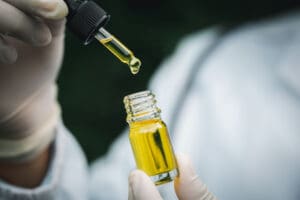The Author’s Background
I am a psychiatric pharmacist that works in the emergency department of one of the largest mental health hospitals in North America. I work extensively with the patient population susceptible to psychosis. I will be using my experience along with clinical data to provide some background on cannabis and it’s relationship with psychosis.
What is psychosis?
Psychosis is a condition that alters how the brain processes information. It can cause delusions, paranoia, visual and/or auditory hallucinations. This can be induced by a mental illness, substance use, extreme stress or trauma. According to the Center of Addiction and Mental Health, 3 in every 100 people will experience an episode of psychosis in their lifetime. It affects all races, ethnicities, sexes, and socioeconomic groups equally and typically first occurs in the late teens or early twenties. Interestingly, women may respond to treatment more effectively compared to men.
Psychosis is something that holds a lot of stigma, which is why many patients are apprehensive to disclosing their experiences. This has led to a spread of misinformation regarding psychosis and what can cause it.
Cannabis Intoxication vs Cannabis Induced Psychotic Disorder (CIPD)
It’s thought that the THC (Tetrahydrocannabinol) in cannabis can cause psychosis since it is the most psychoactive component in cannabis.
Cannabis intoxication also known as “getting high” differs from CIPD. The psychotic symptoms of cannabis intoxication are not significant enough to need clinical treatment. Whereas in CIPD, the psychosis is significant and longer lasting which can result in family or law enforcement bringing the patient to a hospital for treatment. In cannabis intoxication, also known as the “high”, the patient may experience some mild alterations to perception which resolves in less than 24 hours. CIPD can last weeks in more severe cases.
How is Cannabis Induced Psychosis diagnosed?
There are guidelines that doctors follow in the Diagnostic and Statistical Manual of Mental Disorders (DSM-5) to help diagnose cannabis induced psychotic disorder (CIPD). To be diagnosed, a patient must experience either hallucinations and/or delusions after becoming intoxicated on cannabis. The experience must have significant impairment on the patient’s functioning. The patient’s psychotic symptoms cannot be better explained by other factors such as a medical condition, trauma, stress or another substance. If psychotic symptoms persist for more than a month, another diagnosis other than cannabis induced psychosis should be considered. Interestingly, it can take up to weeks of cannabis use before psychosis is induced.
Who is at risk of Cannabis Induced Psychotic Disorder?
A small portion of cannabis users are susceptible to psychosis and may need to be brought into the hospital for treatment by family members or police due to their intense paranoia, hallucinations, or delusions. What can complicate treatment is when the patient already has a psychiatric condition that causes psychosis, like schizophrenia. In these situations, the THC can drastically worsen the patient’s psychotic symptoms to a point where a lengthier hospital admission is required as it usually takes longer for these patients to return to baseline.
How is Cannabis Induced Psychotic Disorder treated?
Cannabis induced psychosis is treated like any other substance induced psychosis:
- Antipsychotics are provided to manage psychosis.
- The patient stays in hospital until the cannabis clears from their system and the delusions/hallucinations subside.
- The patient is discharged.
For patients who are susceptible to cannabis induced psychosis, avoiding THC consumption is the best course of action. Patients with a family history of psychiatric conditions such as bipolar disorder and schizophrenia are more likely to experience psychosis from cannabis and should avoid its use. CBD (cannabidiol) only products such as hemp, CBD oils and CBD tinctures are better options to avoid the psychoactive component in cannabis. Interestingly, there is some research that suggests CBD may actually help treat psychosis. However, there is not enough data to unequivocally prove this; much more research is to be done to verify this claim.
Author’s Thoughts
Bottom line, most cannabis users will not experience cannabis induced psychosis. However, the few that are susceptible should avoid THC consumption. In situations where patients feel they need to use cannabis, they should try to use CBD only cannabis products. In this way, they minimize their exposure to THC, which is important to avoid CIPD. More research needs to be done to understand cannabis induced psychosis and more effort needs to be done educating the general public of these risks.


